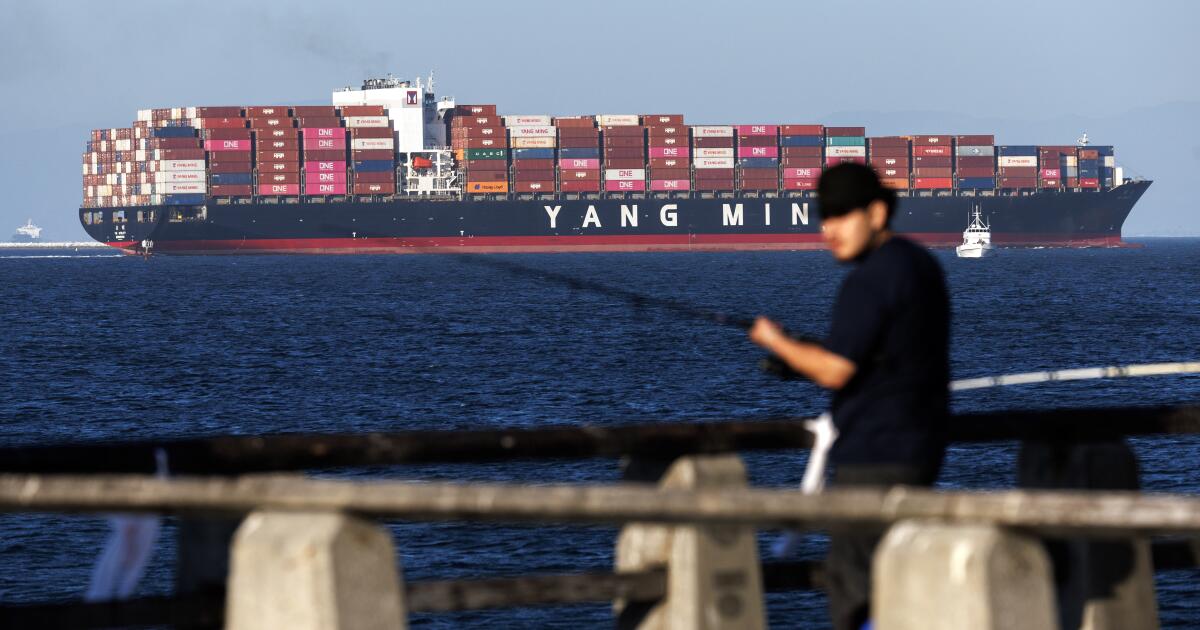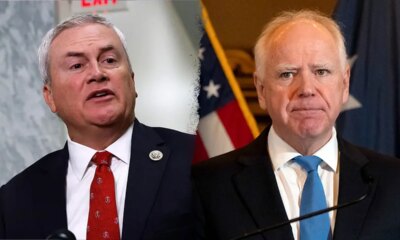Business
Trump tees up tariff hikes on top trading partners. What's at stake for California?

WASHINGTON — When President-elect Donald Trump announced he would impose sweeping tariffs on key trading partners on his first day in office, he signaled a return to a favorite strategy: a reverse carrot-and-stick that applies the stick of dire consequences in order to force countries to give him what he wants. In this case, that means a tougher crackdown on illegal migration and the movement of drugs into the U.S.
The risk of applying this tactic to foreign trade is that the whole U.S. economy is so reliant on the status quo that any miscalculation could have damaging consequences, especially in California and other trade-dependent states.
To some extent, that happened in Trump’s first term, when selective tariff increases set off costly trade wars with China and others.
The fallout from tariffs could have major damaging effects on California’s globally integrated economy, affecting thousands of businesses and many more jobs, consumer prices and choices of goods. And, if trading partners retaliate, tariff increases could hurt the state’s sales of farm goods, electronics, transportation equipment and other leading exports. Mexico and Canada are the top two destinations for California exports, and China and Mexico account for the bulk of the state’s imports.
Even uncertainty over such possibilities can cause havoc in financial markets and raise fears of higher prices, as well as disruptions to vital businesses dependent particularly on Mexico and the Pacific Rim.
Trump posted on his Truth Social site late Monday that on his first day on the job he would impose 25% tariffs on all goods from Canada and Mexico, and also tack on an additional 10% levy on Chinese imports. He said these countries — which are the United States’ top three trading partners — would be paying the price for not doing enough on illegal migration and drugs flowing into the U.S.
“This Tariff will remain in effect until such time as Drugs, in particular Fentanyl, and all Illegal Aliens stop this Invasion of our Country!” Trump wrote.
The reality is that illegal border crossings from Mexico have fallen dramatically in recent months as the Biden administration has tightened up especially on asylum arrivals.
And U.S. drug seizures along the Southwest border have changed little in recent years, according to Department of Homeland Security statistics.
For years, China has been a major producer of fentanyl coming into the U.S., and Trump said in his post that Beijing has failed to clamp down on drug suppliers as it had promised.
Canada is not a big source of illicit drugs or illegal migration into the U.S., although there has been a sharp increase in unauthorized crossings along the northern border in the last year, driven in large part by Indians. Trump didn’t explain why Canada was targeted, but some analysts said he may be viewing the drug and migration situation as a North American problem.
U.S. stock markets, which had been on a run in recent days, opened mixed Tuesday but ended the day higher, suggesting that investors are familiar with Trump’s playbook and that these three countries could avoid the tariffs if they present a credible plan to curb the drug supplies and secure the borders, said analysts at Capital Economics. Mexico staved off a similar Trump threat over illegal migration in 2019.
But Trump’s salvo just three weeks after the election, plus his frequent campaign promises of hiking tariffs, suggests that he will move more quickly in carrying out his trade agenda than in his first term.
Trump has said he would slap tariffs of 10% to 20% on goods from around the world, and up to 60% on imports from China.
The consequences could be dire for California’s economy, given its heavy trade with China and Mexico.
Imports from China ($120 billion) and Mexico ($62 billion) accounted for a full 40% of the $450 billion worth of foreign products that entered California last year. And Mexico, Canada and China rank as the state’s top three export markets.
Overall, international trade and investment and related commerce employ hundreds of thousands of Californians and are a major economic engine for the state.
At the Port of Los Angeles, China’s share of all cargo, as measured by containers, has fallen to 43% from 57% in 2022. But the Port of L.A., the busiest in the nation, has kept growing in overall volume due to increased shipments from other Pacific Rim countries.
With U.S.-China relations worsening over the last decade, many manufacturers in California, as elsewhere, shifted at least some production and suppliers away from China to other sites in Asia and also to Mexico. But the scale of tariffs that Trump is announcing, whether 10% across the globe or separate duties on Chinese, Mexican and Canadian goods, would be too great for other countries to make up.
Much of U.S. imports from China and Mexico are consumer goods and intermediate parts that go into autos, appliances and other products. Southern California apparel companies have for years been sending clothes to be sewn and finished in Mexico, duty-free. Vehicle components often cross North American borders back and forth several times before final assembly — and tariffs added along the way will mean higher prices for everybody.
Now those long-established supply chains may be in jeopardy as analysts expect Trump to try to remake trade deals with North American partners, among others, using tariffs and the big American economic market as leverage.
“It’s going to be a jolt to the system, and at the end of the day it will be impactful to consumer pocketbooks,” said Rachel Michelin, president of the California Retailers Assn. She said her member companies have been trying to get ahead of higher tariffs by ordering products before Trump takes office.
“From a California perspective, it’s going to be alarming because the cost of living here is higher,” Michelin said. “We really are pricing people out of living in California.”
In Trump’s first term, China and other countries hit back by raising tariffs on sensitive American farm goods, including soybeans and wine. But overall trade also slowed, with U.S. companies scurrying to file for tariff exemptions and trying to curry favor with his administration for relief.
Jock O’Connell, a California trade specialist at Beacon Economics, said the Trump administration’s trade skirmishes with China in 2017 caused a dramatic falloff in the state’s trade volume. California exporters learned to diversify their markets. This time around, he said, the state may have even fewer options.
“There’s not going to be a lot of political payoff” in helping California, O’Connell said. “Can you imagine [Gov.] Newsom flying to Washington to meet with trade officials in the White House to deal with tariffs?”
Greg Danenhauer, co-owner of Parker Boiler, a manufacturer in City of Commerce, said he still buys some steel and cast iron burners from China, but overall looks to China for less than 18% of his supplies, compared with as much as 25% in 2016. Parker Boiler also buys temperature controls and other products from Mexico.
Danenhauer said Trump’s earlier tariffs on Chinese products actually helped level the playing field for domestic makers such as himself. And he’s not worrying about higher tariffs down the road.
“To me, everybody is panicked about it,” he said. “But we don’t know yet” what’s coming, he said.
Dan Ujczo, a trade lawyer at the Ohio-based firm Thompson Hine, drew a distinction between Monday’s tariff announcement, which he said was “very tactical and transactional, targeted for a specific purpose,” and Trump’s plans on universal tariffs and those aimed at China. The latter “are more transformative or transitional when it comes to global trade,” he said, adding that they are likely to be proposed later and closer to when tax cuts and other fiscal plans are ready.
During his first term, Trump often used threats such as high tariffs to browbeat America’s allies into concessions. On defense policy, for instance, he famously raised doubts about continued U.S. participation in the North Atlantic Treaty Organization; European allies responded by boosting their contributions to the cost of mutual defense.
Chinese imports are already subject to U.S. tariffs of 10% to 25% stemming from Trump’s actions in his first term and which were left in place by President Biden. That helped Mexico overtake China in 2021 as the United States’ top two-way trading partner. Still, the United States’ biggest trade deficit, by far, remains with China, in excess of $279 billion last year, according to the Census Bureau.
Trump’s tariffs announced Monday, if implemented, would almost certainly cause significant disruptions for industries and raise consumer costs for gas, autos and all sorts of other products, possibly reigniting inflation, which appeared to be a key factor in his election victory.
The U.S. imported a total of about $1.3 trillion worth of goods from those three countries last year, and about two-thirds of that amount came in tariff-free, thanks to the U.S. free trade agreement with Mexico and Canada.
Despite that trade pact, experts said Trump could impose the tariffs by using the statutory authority under the International Emergency Economic Powers Act of 1977, which he cited extensively in his first term, including in his dealings with Mexico and China.
Whether tactical or not, the tariff threats could escalate — Mexico already said it could retaliate with counter-tariffs. And some economists warned that Trump’s plans could backfire.
“It’s a reckless grenade toss,” said Michael Clemens, an economics professor at George Mason University who specializes in international migration. “Harming American consumers and workers with a trade war will do nothing at all to address their concerns about immigration and drugs.”

Business
iPic movie theater chain files for bankruptcy

The iPic dine-in movie theater chain has filed for Chapter 11 bankruptcy protection and intends to pursue a sale of its assets, citing the difficult post-pandemic theatrical market.
The Boca Raton, Fla.-based company has 13 locations across the U.S., including in Pasadena and Westwood, according to a Feb. 25 filing in U.S. Bankruptcy Court in the Southern District of Florida, West Palm Beach division.
As part of the bankruptcy process, the Pasadena and Westwood theaters will be permanently closed, according to WARN Act notices filed with the state of California’s Employment Development Department.
The company came to its conclusion after “exploring a range of possible alternatives,” iPic Chief Executive Patrick Quinn said in a statement.
“We are committed to continuing our business operations with minimal impact throughout the process and will endeavor to serve our customers with the high standard of care they have come to expect from us,” he said.
The company will keep its current management to maintain day-to-day operations while it goes through the bankruptcy process, iPic said in the statement. The last day of employment for workers in its Pasadena and Westwood locations is April 28, according to a state WARN Act notice. The chain has 1,300 full- and part-time employees, with 193 workers in California.
The theatrical business, including the exhibition industry, still has not recovered from the pandemic’s effect on consumer behavior. Last year, overall box office revenue in the U.S. and Canada totaled about $8.8 billion, up just 1.6% compared with 2024. Even more troubling is that industry revenue in 2025 was down 22.1% compared with pre-pandemic 2019’s totals.
IPic noted those trends in its bankruptcy filing, describing the changes in consumer behavior as “lasting” and blaming the rise of streaming for “fundamentally” altering the movie theater business.
“These industry shifts have directly reduced box office revenues and related ancillary revenues, including food and beverage sales,” the company stated in its bankruptcy filing.
IPic also attributed its decision to rising rents and labor costs.
The company estimated it owed about $141,000 in taxes and about $2.7 million in total unsecured claims. The company’s assets were valued at about $155.3 million, the majority of which coming from theater equipment and furniture. Its liabilities totaled $113.9 million.
The chain had previously filed for bankruptcy protection in 2019.
Business
Startup Varda Space Industries snags former Mattel plant in El Segundo

In an expansion of its business of processing pharmaceuticals in Earth’s orbit, Varda Space Industries is renting a large El Segundo plant where toy manufacturer Mattel used to design Hot Wheels and Barbie dolls.
The plant in El Segundo’s aerospace corridor will be an extension of Varda Space Industries’ headquarters in a much smaller building on nearby Aviation Boulevard.
Varda will occupy a 205,443-square-foot industrial and office campus at 2031 E. Mariposa Ave., which will give it additional capacity to manufacture spacecraft at scale, the company said.
Originally built in the 1940s as an aircraft facility, the complex has a history as part of aerospace and defense industries that have long shaped the South Bay and is near a host of major defense and space contractors. It is also close to Los Angeles Air Force Base, headquarters to the Space Systems Command.
Workers test AstroForge’s Odin asteroid probe, which was lost in space after launch this year.
(Varda Space Industries)
Varda is one of a new generation of aerospace startups that have flourished in Southern California and the South Bay over the last several years, particularly in El Segundo, often with ties to SpaceX.
Elon Musk’s company, founded in 2002 in El Segundo, has revolutionized the industry with reusable rockets that have radically lowered the cost of lifting payloads into space. Though it has moved its headquarters to Texas, SpaceX retains large-scale operations in Hawthorne.
Varda co-founder and Chief Executive Will Bruey is a former SpaceX avionics engineer, and the company’s spacecraft are launched on SpaceX’s workhorse Falcon 9 rockets from Vandenberg Space Force Base in Santa Barbara County.
Varda makes automated labs that look like cylindrical desktop speakers, which it sends into orbit in capsules and satellite platforms it also builds. There, in microgravity, the miniature labs grow molecular crystals that are purer than those produced in Earth’s gravity for use in pharmaceuticals.
It has contracts with drug companies and also the military, which tests technology at hypersonic speeds as the capsules return to Earth.
Its fifth capsule was launched in November and returned to Earth in late January; its next mission is set in the coming weeks. Varda has more than 10 missions scheduled on Falcon 9s through 2028.
For the last several decades, the Mariposa Avenue property served as the research and development center for Mattel Toys. El Segundo has also long been a center for the toy industry as companies like to set up shop in the shadow of Mattel.
The Mattel facility “has always been an exceptional property with a legacy tied to aerospace innovation, and leasing to Varda Space Industries feels like a natural continuation of that story,” said Michael Woods, a partner at GPI Cos., which owns the property.
“We are proud to support a company that is genuinely pushing the boundaries of what’s possible, and are excited to watch Varda grow and thrive here in El Segundo,” Woods said.
As one of the country’s most active hubs of aerospace and defense innovation, El Segundo has seen its industrial property vacancy fall to 3.4% on demand from space companies, government contractors and technology startups, real estate brokerage CBRE said.
Successful startups often have to leave the neighborhood when they want to expand, real estate broker Bob Haley of CBRE said. The 9-acre Mattel facility was big enough to keep Varda in the city.
Last year, Varda subleased about 55,000 square feet of lab space from alternative protein company Beyond Meat at 888 Douglas St. in El Segundo, which it started moving into in June.
Varda will get the keys to its new building in December and spend four to eight months building production and assembly facilities as it ramps up operations. By the end of next year, it expects to have constructed 10 more spacecraft.
In the future, Varda could consolidate offices there, given its size. Currently, though, the plan is to retain all properties, creating a campus of three buildings within a mile of one another that are served by the company’s transportation services, Chief Operating Officer Jonathan Barr said.
“We already have Varda-branded shuttles running up and down Aviation Boulevard,” he said.
Business
How Iran War Is Threatening Global Oil and Gas Supplies

Ships near the Strait of Hormuz before and after attacks began
Every day, around 80 oil and gas tankers typically pass through the Strait of Hormuz, the narrow waterway off Iran’s southern coast that carries a fifth of the world’s oil and a significant amount of natural gas.
On Monday, just two oil and gas tankers appear to have crossed the strait, according to a New York Times analysis of shipping activity from Kpler, an industry data firm. Since then, one tanker passed through.
“It’s a de facto closure,” said Dan Pickering, chief investment officer of Pickering Energy Partners, a Houston financial services firm. “You’ve got a significant number of vessels on either side of the strait but no one is willing to go through.”
Tankers have been staying away from Hormuz since the U.S.-Israeli attacks on Iran that began on Saturday. A prolonged conflict could ripple broadly across the global economy, threatening the energy supplies of countries halfway around the world and stoking inflation.
International oil prices have climbed 12 percent since the fighting began, trading Tuesday around $81 a barrel, and natural gas prices have surged in Europe and in Asia.
A senior Iranian military official threatened on Monday to “set on fire” any ships traveling through the Strait of Hormuz. Vessels in the region have already come under attack. Several oil and gas facilities have also been struck or affected by nearby shelling, though the damage did not initially appear to be catastrophic.
Where ships and energy facilities have been damaged
A fire broke out Tuesday at a major energy hub in Fujairah, United Arab Emirates, from the falling debris of a downed drone, the authorities said. On Monday, Qatar halted production of liquefied natural gas, or fuel that has been cooled so that it can be transported on ships, after attacks on its facilities.
The sharp reduction in tanker traffic is reducing the supply of oil and gas to world markets, pushing up prices for both commodities. And the longer that ships stay away from the Strait of Hormuz, the less oil and gas get out to the world, which could raise prices even more.
Shipping companies have paused their tankers to protect their crew and cargo, and because insurance companies are charging significantly more to cover vessels in the conflict area.
On Tuesday, President Trump said that “if necessary,” the U.S. Navy would begin escorting tankers through the strait. He also said a U.S. government agency would begin offering “political risk insurance” to shipping lines in the area.
In addition to tankers, other large vessels regularly go through the strait, including car carriers and container ships. In normal conditions, nearly 160 make the trip each day.
Some ships in the region turn off the devices that broadcast their positions, while others transmit false locations — making it hard to give a full picture of the traffic in the strait.
The Shiva is a small oil tanker that has repeatedly faked its location, according to TankerTrackers.com, which tracks global oil shipments. It is suspected of carrying sanctioned Iranian oil, according to Kpler. The Shiva was one of the two tankers that crossed the strait on Monday.
The oil and gas that typically move through the strait come from big producing countries like Saudi Arabia, Iraq, Iran and United Arab Emirates, and are exported around the world.
Where tankers moving through the Strait have traveled
In 2024, more than 80 percent of the oil and gas transported through the Strait of Hormuz went to Asia. China, India, Japan and South Korea were the top importers, according to the U.S. Energy Information Administration.
Countries have energy stockpiles that could last them into the coming months, but a continued shutdown of the strait could damage their economies.
Several big disruptions have roiled supply chains in recent years, but the tanker standstill in the Strait of Hormuz could have an outsize impact.
-

 World1 week ago
World1 week agoExclusive: DeepSeek withholds latest AI model from US chipmakers including Nvidia, sources say
-

 Massachusetts1 week ago
Massachusetts1 week agoMother and daughter injured in Taunton house explosion
-

 Wisconsin3 days ago
Wisconsin3 days agoSetting sail on iceboats across a frozen lake in Wisconsin
-

 Maryland4 days ago
Maryland4 days agoAM showers Sunday in Maryland
-

 Denver, CO1 week ago
Denver, CO1 week ago10 acres charred, 5 injured in Thornton grass fire, evacuation orders lifted
-

 Florida4 days ago
Florida4 days agoFlorida man rescued after being stuck in shoulder-deep mud for days
-

 Massachusetts2 days ago
Massachusetts2 days agoMassachusetts man awaits word from family in Iran after attacks
-

 Oregon6 days ago
Oregon6 days ago2026 OSAA Oregon Wrestling State Championship Results And Brackets – FloWrestling




















